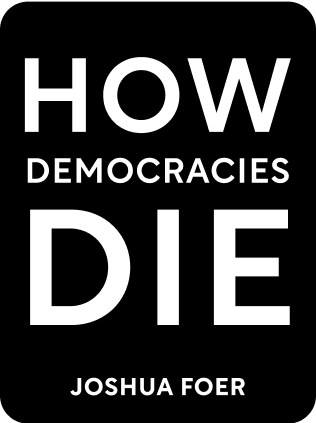

This article is an excerpt from the Shortform book guide to "How Democracies Die" by Steven Levitsky and Daniel Ziblatt. Shortform has the world's best summaries and analyses of books you should be reading.
Like this article? Sign up for a free trial here .
Is Levitsky and Ziblatt’s book How Democracies Die worth reading? Did the success of Trump—an inexperienced outsider with possibly authoritarian instincts—suggest that democracy in the U.S. is backsliding?
In How Democracies Die, authors Steven Levitsky and Daniel Ziblatt set out to analyze democracy’s long-term prospects for survival in the United States. To this end, they examine the historical processes by which democratic norms and institutions came to extinction in other countries in the 20th and 21st centuries and offer a blueprint for how to save the U.S.
This How Democracies Die review covers the book’s context, background, and critical reception by the readers.
About the Authors
Co-authors Steven Levitsky and Daniel Ziblatt are prominent scholars on the topics of democratization, authoritarianism, and democratic backsliding.
Levitsky’s work has primarily concentrated on the problems of authoritarianism and democracy in the context of Latin American politics. His works as a co-author and editor on these topics include:
- Transforming Labor-Based Parties in Latin America: Argentine Peronism in Comparative Perspective (2003)
- Argentine Democracy: The Politics of Institutional Weakness (2005)
- Informal Institutions and Democracy: Lessons from Latin America (2006)
- Competitive Authoritarianism: Hybrid Regimes after the Cold War (2010)
- The Resurgence of the Latin American Left (2011)
Levitsky is the David Rockefeller Professor of Latin American Studies at Harvard University and a former visiting fellow at the Kellogg Institute for International Studies.
Ziblatt—Eaton Professor of Government at Harvard University and director of the Transformations of Democracy group at the WZB Berlin Social Science Center—is an expert on the history of European democracy. In his work, Ziblatt has explored the process of European state-building through the lens of the successful Italian and German unification efforts of the mid-19th century. He has also examined the special role that nations’ conservative parties play in determining the long-term survival of democracy.
Specifically, Ziblatt argues that democratic viability hinges on the willingness of conservative political parties such as the Tories in Britain—parties typically associated with nobility and landed privilege—to accommodate themselves to representative forms of government and keep in check the forces of the radical right. Where conservative parties accepted democracy and proved willing to compete in the electoral process (as in Britain in the 1830s), democracy survived; where conservative elites held themselves aloof from democracy or actively sought to undermine it (as in Bismarckian and Wilhelmine Germany) democracy proved stillborn and ultimately vulnerable to right-wing demagoguery.
Besides How Democracies Die, his works include:
- Structuring the State: The Formation of Italy and Germany and the Puzzle of Federalism (2006)
- Conservative Parties and the Birth of Democracy (2017)
Connect With Levitsky and Ziblatt
Social Links:
Learn More:
- NPR “Fresh Air” podcast, January 22, 2018, featuring Ziblatt and Levitsky
- “How Democracies Die: U.S. Democracy Three Years After Trump’s Election,” lecture by co-author Steven Levitsky on November 7, 2019
The Book’s Publication
How Democracies Die was published in 2018 by Penguin Random House.
Although both co-authors were already acknowledged experts in the fields of democracy formation and downfall at the time of the book’s publication, How Democracies Die is the best-known and bestselling work for either Levitsky or Ziblatt. It attracted a great deal of attention and commentary within academic journals as well as mainstream media as it rose to #12 on the New York Times Best Seller list. Since publication, the authors have appeared on multiple podcasts, television interviews, and have published joint op-eds in major publications discussing the topics in the book.
The Book’s Context
Levitsky and Ziblatt’s book was part of an outpouring of works by commentators, journalists, and political scientists in the wake of Donald Trump’s surprise victory in the 2016 U.S. presidential election. Other notable books from this period arguing that Trump’s presidency was an attack on democracy include:
- On Tyranny: Lessons From the Twentieth Century (2017) by Timothy Snyder
- Trumpocracy: The Corruption of the American Republic (2018) by David Frum
- Fascism: A Warning (2019) by Madeleine Albright
- Surviving Autocracy (2020) by Masha Gessen
Critical Reception
How Democracies Die reviews were largely positive. The book was hailed by many as an important contribution to political science (especially in understanding the contemporary rise of right-wing populism) by publications like the New York Times and the Washington Post. Former President Barack Obama even listed it as one of his favorite books of 2018.
Commentators viewed Levitsky and Ziblatt’s work as an important analysis of how, in the modern era, a new wave of charismatic, demagogic outsiders have successfully eroded democratic norms in country after country without resorting to violent coups or military overthrows—instead, winning elections legitimately and then using their power to rewrite the rules and lock their opponents out of power.
However, some critics did think that the authors exaggerated or overplayed the threat to U.S. democracy posed by Trump. Writing in the New York Times, Nicholas Kristof argued that America’s democratic institutions had stood up well to Trump at the time of the book’s publication.
Kristof and other critics argued that America’s democratic system of government and tradition of democratic politics was older, more robust, and better-tested than those of countries like Venezuela, Peru, Hungary, and others profiled in How Democracies Die. As such, they argued, comparisons between those countries and the U.S. were inappropriate and misleading. In The Guardian, David Runciman argued that the book’s approach of using comparative historical analysis of other democratic collapses to get insight into the contemporary U.S. situation was fundamentally flawed. Given the enormous differences between the contemporary U.S. and countries profiled in the book (like 1970s Chile or Weimar Germany), he believed the historical parallels only offered limited insight.
Critics on the political right, meanwhile, claimed that Levitsky and Ziblatt, with their harsh criticism of Trump and the Republican Party, were guilty of violating the very same democratic norms they purported to cherish. Writing in the Wall Street Journal, reviewer Jason Willick argued that the book demonized Republicans and conservatives by representing them as a singular threat to democracy. This demonization of one’s opponents, argued Willick, was the very thing Levitsky and Ziblatt were warning against. He and other conservative commentators argued that How Democracies Die was an overly partisan work, calling out allegedly anti-democratic behavior by right-wing politicians while ignoring similar transgressions committed by the left and the so-called “Resistance” to Trump.
Finally, some reviewers simply found the prose style somewhat dull and repetitive, drifting too much into political science jargon for the average reader.
Commentary on the Book’s Approach
Levitsky and Ziblatt establish the patterns and practices by which democracies succumb to authoritarianism, highlighting the shared characteristics of authoritarian leaders of the recent past (generally, though not exclusively, focusing on leaders who rose to power after World War Two). They then apply this analysis to Donald Trump and his surprising rise to power in the U.S., using the success of his campaign to indict the Republican Party’s leadership for what they see as its failure to stop him from securing their nomination. They finish by analyzing Trump’s performance in office (although his presidency was barely a year old at the time of publication) and evaluating how democracy had fared under him thus far.

———End of Preview———
Like what you just read? Read the rest of the world's best book summary and analysis of Steven Levitsky and Daniel Ziblatt's "How Democracies Die" at Shortform .
Here's what you'll find in our full How Democracies Die summary :
- How shared norms are essential for preserving democracy
- Why the Trump presidency threatened those shared norms
- Why democracy goes beyond individual leaders and parties and must be a shared enterprise among committed individuals






